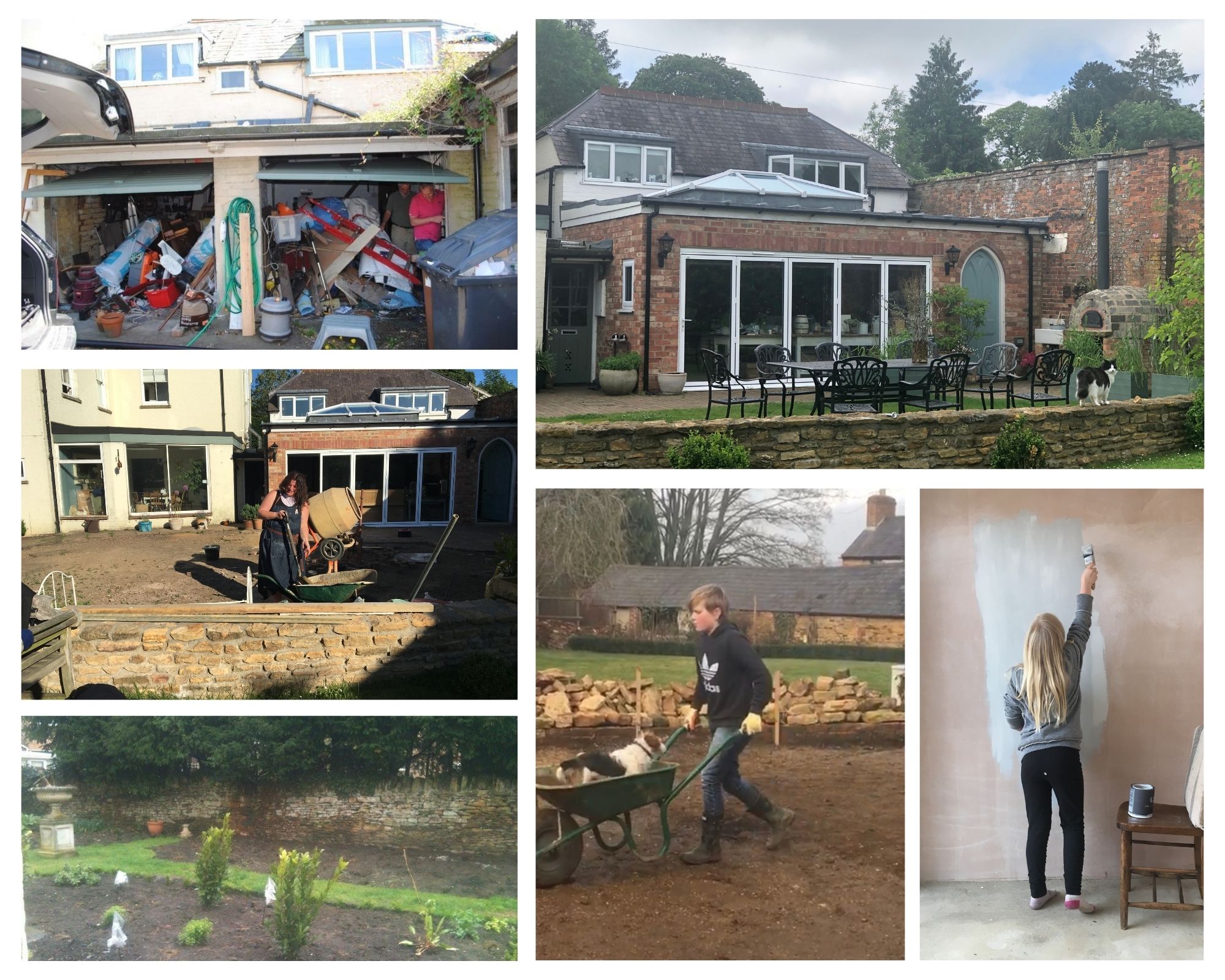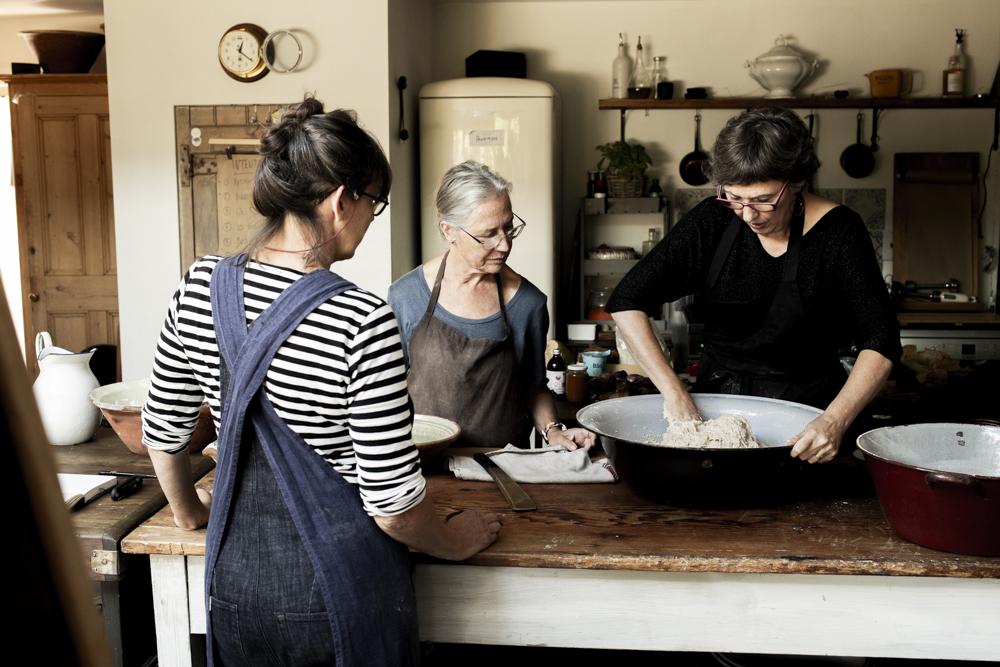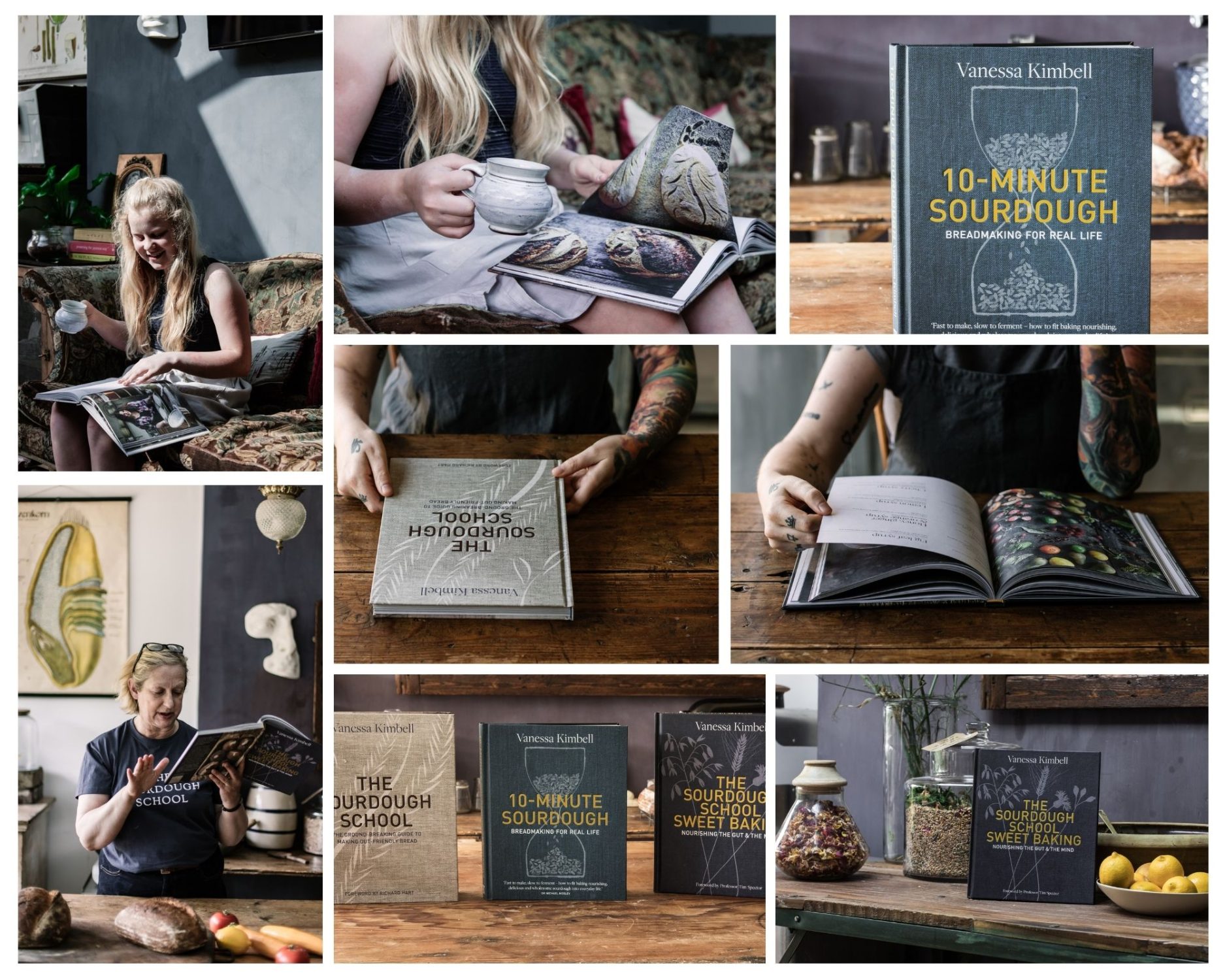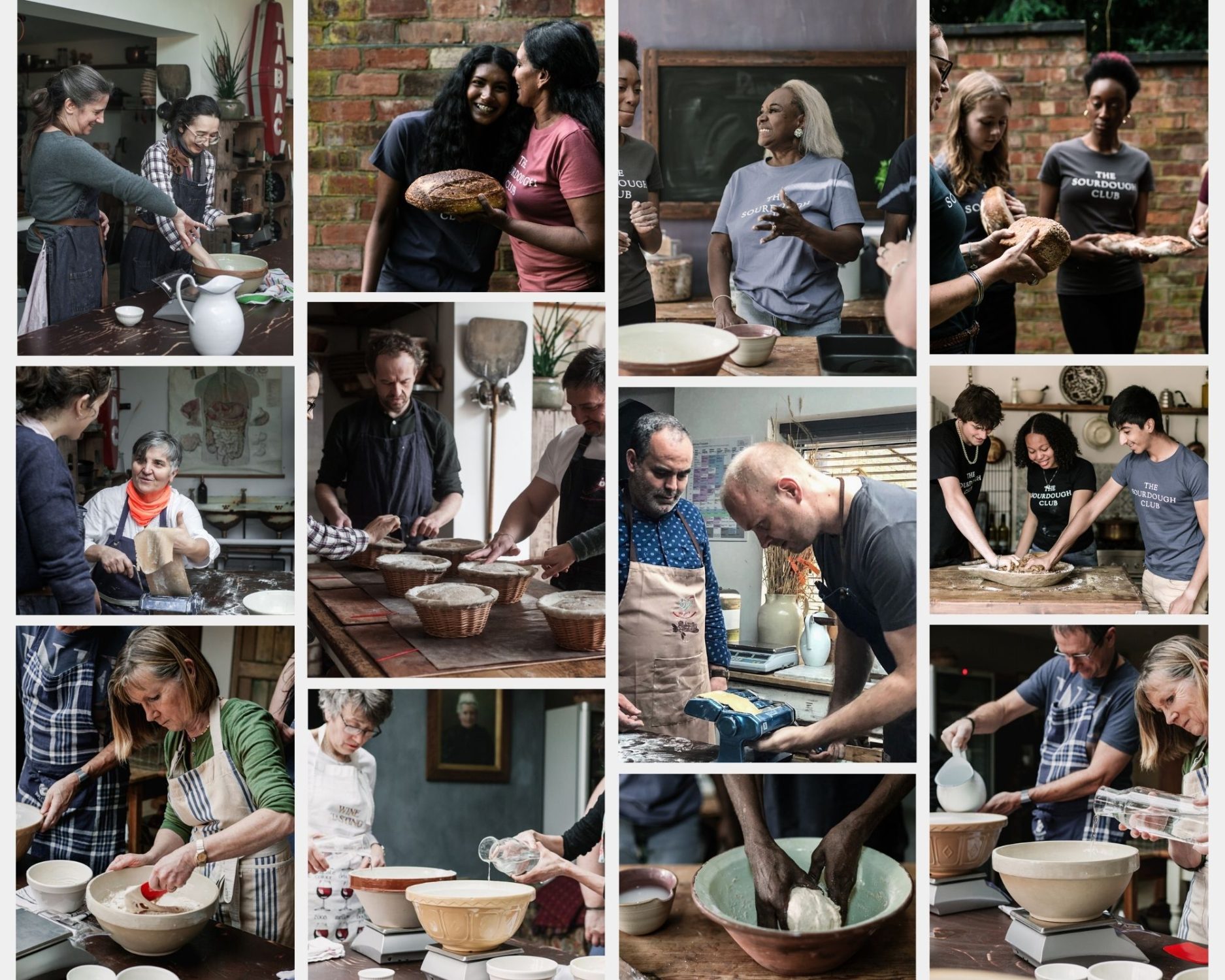“When it comes to gut health, Vanessa will teach you to make the healthiest bread in the world.”
We take a different approach to teaching people to bake bread. Our focus is on understanding how your body responds to the foods you eat, considering factors such as digestion, nutrient absorption, and individual health needs.
We have been teaching people how to bake and make the healthiest bread in the world for over two decades. Using a Lifestyle Medicine and functional nutrition approach to baking, you’ll learn about healthy bread and how bread made with diverse grains, botanicals, and long, slow fermentation optimises gut health and supports mental well-being so you can create bread that lays the foundation for preventative health in the way you bake, eat, and share your bread every day.
The Sourdough School is central to a transformative systems change movement for bread. The first lessons were taught to a small class of family and friends, and it has since taught thousands of bakers in person and online from over 84 countries. Many people want to know if sourdough bread is the healthiest, and our BALM Protocol is the framework for the gold standard in healthy bread. We teach people to bake, but our lessons and syllabus extend beyond baking. We teach students as part of a wider agenda. The Sourdough School operates as a social enterprise, and our courses are a gateway to joining a systems change program. Our approach to teaching is called Baking as Lifestyle Medicine. We do more than teach, we have created an approach to the courses and the structure of our programmes that has created a self-funding programme, and both the Sourdough School Diploma and the Certificate qualify students to use the BALM protocol beyond the course.
For over two decades, The Sourdough School has been pioneering the integration of education, healthcare, food production, and consumption to promote health, sustainability, and social justice; the school is located in the beautiful gardens of Dr Vanessa Kimbell’s home in the rolling Northamptonshire countryside, in the UK. The School is situated in Vanessa Kimbell’s home. We teach from a restored coach house surrounded by organic gardens, and part of the way we teach is to make you at home – quite literally.
Baking and Nutritional Psychiatry
The School is a place to share knowledge about the intricate system of connections – from soil to sourdough – understanding their choices’ impacts on personal health and the environment. Students learn not only about the technical aspects of making sourdough but also about the microbial world, the soil, the starter, and the biosphere. They learn how microbes transform the properties of bread, how baking, eating, and sharing bread impact our planet, and how it influences their gut microbiome and subsequently impacts how they feel and how we live their lives.
The Early Days
The Sourdough School was an idea that began 25 years ago when Vanessa started teaching small classes around her kitchen table. She taught in schools and village halls until, in 2011, she and her family bought a dilapidated Victorian house. Initially, she taught in the kitchen, but juggling a young family and pets, along with the children repeatedly eating her ingredients before a class, meant rethinking how she taught. She did not want a cookery school or commercial kitchen environment, so to retain the authenticity and connection, she decided to tutor students in a home environment which has been central to the way has taught throughout her career.
In 2015, Vanessa and her family opened a dedicated classroom, transforming the coach house into a home-based learning environment. The restoration used materials rescued and brought from France, giving the space a French feel. An old sink Vanessa stopped from being smashed in the village in the dordogne was given to her brother who brought it back, the linen cupboard from her childhood home was repurposed as a proofing cabinet, a church door that Vanessa spotted as an old chapel was being demolished in Oxfordshire was incorporated. Even the workbench she teaches was originally a fabric bench which she repurposed as a kitchen bench by filing coffee tins with concrete to raise the height. This is far more than a classroom, it created a warm, personal space for sharing knowledge which was central to implementing the Japanese theory of Ba.

The Japanese Theory of Ba at The Sourdough School
People often remark that Vanessa's approach to teaching is fundamentally different from traditional courses. She attributes this to grounding her teaching in the Japanese theory of "Ba" and teaching from a home based classroom has been the foundation of this approach.
"Ba," was introduced by Ikujiro Nonaka and Hirotaka Takeuchi, in 1995 and represents a shared space that fosters interactions for knowledge creation and sharing. Vanessa set out to create an environment that is about bringing together people, ideas, and information in a way that sparks collective learning and innovation. Rather than follow conventional teaching methods, The Sourdough School is about being part of a vibrant community where knowledge is co-created and shared and this is key to learning how baking at home or in a bakery is activism. This theory is also followed on in the live sessions online each week.
Learning here is not a matter or being lectured - to is a collaborative and interactive processes. To personalise bread participants are encouraged to share their experiences, insights, and techniques and this makes each workshop and class a unique experience rhrough collective wisdom in baking. This isn't just about a single person teaching; it’s about all of us learning together. By building a community of learners who support and inspire each other students are encouraged to do the same, and likewise transform bread through sharing.
The style Vanessa is about experimenting, and reflecting on the experience, integrating many disciplines—nutrition, microbiology, and lifestyle medicine—into our teaching, providing a comprehensive understanding that goes far beyond the bread itself.
It is important to to understand that The Sourdough School is more than just a place to learn; it’s a dynamic, collaborative space where students are expected to participate as knowledge is shared, developed, and applied in ways that benefit both individuals and the broader community. This is the heart of what we do—creating a unique personalised learning environment that inspires and supports a shift in the way you understand bread and your role as a baker.

The Sourdough School Gardens
At The Sourdough School, we are not just about baking bread. We are about baking bread with a purpose, fostering health and wellness, nurturing resilient communities, and caring for our planet. Bread is our basic food and our most inexpensive, and yet it has been so changed in the past century that it is no longer even recognisable as bread. To understand bread you need to start with the soil.
The gardens are part of your learning experience and connect you to the soil, growing grain, understanding the whole system. Vanessa is renowned for inspiring people to bake through understanding, not just the fermentation of bread, but the interconnectedness of the microbes. Central to her teaching is understanding the gut microbiome, and the connection to the microbes, so many of her classes start in the garden or the barn.
The classes are about more than just teaching people to bake bread. To support our students to use the knowledge of how to bake bread that nourishes and becomes a medium of health, understanding the environment is the start point of how we make bread and how to bake in a way that encourages all microbes to flourish.

The Sourdough School Books changed the bread world
The Sourdough School books are best sellers.
Vanessa began writing The Sourdough School Books at a time when knowledge about sourdough was sparse and often misunderstood. In the UK, as she set out teaching sourdough was typically associated with San Francisco and she often tells stories that reflect just how little people understood about sourdough. On serval occasions in the early days students would turn up thinking they were going to learn to make Irish soda bread. Once The School was set up Vanessa started writing the books with the aim of to changing the narrative on fermenting bread sharing her extensive knowledge through meticulously crafted books with the aim of demystifying sourdough baking. It was a way to democratise the knowledge the she felt was key to health.

Transforming The Way People Understood Sourdough
The Sourdough School Books have successfully and fundamentally transformed the global understanding and practice of sourdough baking. The books bridged traditional baking methods with contemporary scientific insights, revolutionised the way bakers around the globe understood bread, promoting health and nutrition long before it became fashionable.
Her books, including "The Sourdough School" series, have broken down significant barriers and provided insights previously unavailable to the public. Vanessa introduced techniques that were known by just a few people such as bassinage for improving crumb structure and innovative methods like the chocolate sourdough starter. She provided a clear understanding of using a young levain and differentiating between heterofermentative and homofermentative bacteria, illustrating their impact on flavour and health. These elements have been critical in educating both amateur and professional bakers on the complexities and benefits of sourdough.
The books shared Vanessa's work on the prebiotic effects of sourdough has highlighted its importance for gut health, promoting sourdough as a nutritious, health-supporting food. Her contributions have been recognised by many eminent professionals, including Professor Tim Spector, Baker Richard Hart, writer Nigella Lawson and the late Dr Micheal Mosley have acknowledged the pivotal role of the books in shifting the perception of bread from a mere staple to a vital component of a healthy diet.
The Books influence extends beyond technical techniques to broader agricultural practices. through her writing Vanessa has been a steadfast advocate for diversity in flour to nourish the gut, introducing botanical blend flours that have revolutionised the baking industry’s approach to ingredient diversity. Her commitment to regenerative and organic farming practices over the past 25 years underscores her dedication to sustainable and health-promoting agriculture.
"The Sweet Sourdough School," broke new ground by teaching how to make sweet sourdoughs and integrate beneficial bacteria into everyday baking. This approach supports gut health in innovative ways, such as through fermented components in doughnuts.
The 10-minute Sourdough School book technique, which has made it possible for everyone to enjoy the benefits of sourdough, regardless of time or financial constraints. This technique, along with her other accessible methods, has democratised sourdough baking, making it a feasible and affordable practice for all.
These books have not only transformed individual baking practices but has also influenced the entire bread industry. In the video above baker Steve Rogers explains inches own words how The Sourdough School Books introduced pioneering methods, sustainable practices, and ground breaking knowledge earned the books recognition as game changers in the baking world.
The Sourdough School books have been published across the globe in many languages including French, German, Italian, Spanish, Hungarian and Croatian. These remarkable books have changed the landscape of bread and sourdough globally, and we are very proud of how they have been central to the revolution in understanding bread across the globe.
The Courses – An overview
The Sourdough School offers a diverse range of courses designed to cater to different levels of baking expertise, focusing on the health benefits of sourdough and the principles of Baking as Lifestyle Medicine (BALM).
Introduction to Baking as Lifestyle Medicine
- Duration: 1 Day
- Description: This introductory course provides a foundation in the principles of BALM, focusing on the basics of sourdough baking and its health benefits. It is ideal for beginners who want to understand the impact of bread on digestion and gut health.
- Key Topics: Basic sourdough techniques, introduction to fermentation, and health-focused baking practices..
Workshops
- Duration: 3 Days
- Description: These workshops offer an immersive experience in sourdough baking, combining practical sessions with theoretical knowledge on nutrition and gut health. Small group sizes ensure a personalized learning experience.
- Key Topics: Advanced sourdough techniques, in-depth nutritional education, and hands-on practice with a variety of recipes.
3. Online Diploma in Nutrition and Digestibility of Bread
- Duration: 2 years - a comprehensive training programme in Nutrition and Digestibility of Bread
- Description: This comprehensive online course covers the intricate details of sourdough baking and its health implications. It is designed for those who prefer a self-paced learning environment with access to a wealth of online resources.
- Key Topics: Detailed sourdough baking processes, the science of fermentation, and personalized nutrition strategies.
- Course Enrollment: Open year-round with flexible start dates.
4. Retreats
- Duration: 5-6 Days
- Description: These retreats offer a holistic experience, combining sourdough baking with wellness activities. Participants enjoy an immersive learning environment in a beautiful setting, fostering both personal growth and community.
- Key Topics: Comprehensive sourdough training, wellness practices, and hands-on baking
Each course at The Sourdough School is designed to provide both theoretical knowledge and practical skills, ensuring that participants can confidently bake and incorporate healthy sourdough practices into their daily lives. Whether you are a novice baker or a seasoned professional, there is a course that will suit your needs and help you on your journey to healthier baking.

Filmed in 2011
This video was filmed in 2010. Not much has changed. The children are grown up now, and Vanessa’s hair is grey, but the relaxed French style and warmth of The Sourdough School remains unchanged.
Vanessa’s eldest daughter helps run the research library, and she helps as Vanessa’s PA. Her son William is now 6ft and helps with the IT and recipes testing, and her youngest is always on hand for photoshoots and clearing up after classes. This is part of the story, and The School has retained the low-key French style and personal approach to courses.

